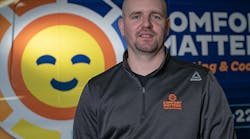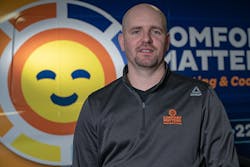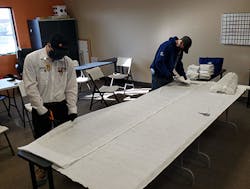When Corey Hickmann started Minneapolis-based Comfort Matters Heating & Cooling 15 years ago, he didn't realize how critical personal protective equipment (PPE) would be — for his customers as well as his employees. But then a novel coronavirus brought us COVID-19, a highly infectious respiratory disease, and suddenly masks, gloves and hand sanitizer were hard to come by.
"Our biggest challenge, in the beginning, was finding sanitation wipes," he recalls. "Obviously, masks and gloves were not a chance. We didn't even try to go that route because it was pretty impossible to get. But we got real lucky; one of the local distilleries switched over their distillery to manufacturing sanitation spray. Our operations manager John knows the owner, so we were able to buy bulk sanitizer from them. Then we had to scramble to try to find bottles to put it in!"
To keep Comfort Matters' 12 HVAC technicians safe while visiting the company's residential customers in the Twin Cities metro area, Hickmann and his team began making their own masks.
"A cloth mask is better than nothing in cases where social distancing isn't always possible, but it provides the lowest level of protection," he explains. "Adding a filter significantly improves the performance and effectiveness of cloth barriers in combating infections."
The HVAC home services company donated free filter inserts to more than 1,000 homes, as well as local nursing homes, retirement homes and meat-processing plants.
But they didn't stop there. The HVAC home services company donated the free filter inserts to more than 1,000 homes, as well as local nursing homes, retirement homes and meat-processing plants.
Comfort Matters set up a website — www.comfortmatters.com/masks — that offers instructions on how people can make masks for themselves, as well as a listing of local mask makers in the Twin Cities area.
"The masks are washable and reusable," Hickmann says. "The process is time-consuming — cutting up mask material and filters, then stuffing envelopes and adding postage — but we've been able to keep our people busy."
Managing from the cloud
While the majority of the staff is working in the office under social distancing guidelines, Hickmann says some of his dispatchers and customer service reps working from home as they have kids to supervise. A fully remote-capable management software system enabled those working from home to access the company files and programs needed to complete their jobs.
When training hasn't been conducive to the video format, classes are broken down into smaller groups of four or five. Technicians are then able to appropriately social distance in the company's large training room.
Hickmann adds that Comfort Matters has provided remote training through Google Hangouts, as well as company meetings. "Honestly, it's kind of frustrating," he says. "It's not a lot of fun doing it through video, but it's what we've had to do, so we've been doing it."
When training hasn't been conducive to the video format, classes are broken down into smaller groups of four or five. Technicians are then able to appropriately social distance in the company's large training room.
Communication is critical in a time of uncertainty, so Comfort Matters launched an internal Facebook page where Hickmann regularly posts what he calls "State of the Union" videos. "Where's the business at? What are we seeing? What do I see is coming? It's vital to keep that line of communication open," he explains.
The page also is open to the spouses or significant others of Comfort Matters staff so they, too, can see how the business is faring during Minnesota's stay-at-home orders. "Technicians don't always go home and tell their wives about their amazing day, right?" Hickmann says. "I know I'm horrible at it. So, by inviting the spouses to view the page, they can hear direct communications from myself or others in the company."
He acknowledges that some staff members and their families went under quarantine because of possible exposure to the coronavirus, but all tested negative for the disease. For any employees who showed any indications of illness, the company erred on the side of caution and had those employees tested and sent home. After negative test results, they were allowed to return to work.
"Of course, we made sure they continued to get paid during that downtime," Hickmann says.
Open communication between management and technicians also is encouraged, especially if a technician has some trepidation about servicing customers' homes. "Mainly, they say, 'This is my job and I'm OK, I'm comfortable with it,'" he says.
No layoffs, no furloughs
Hickmann says the company has moved to a more "hands-free" sales and service process to reduce as much contact as possible between Comfort Matters staff and customers — no handshakes, social distancing, emailed invoices, no signatures required. "We offer masks in every house if the technician wants to wear it or if the customer wants us to wear it," he explains. "Very few people require it."
He acknowledges that initially, some customers were wary about having technicians in their homes. "On the first launch of the shutdown, in March, we noticed people were worried and didn't know what was going to happen," Hickmann notes. "But we didn't get too much pushback on service or maintenance."
On the sales side, however, the company did see a drop in revenue.
"Our replacement equipment side is where we really saw the calls dry up quickly in March," Hickmann states. "That's what created the most concern for me: 'How am I going to keep my sales guys busy?' Because these guys are 100 percent commission home advisors."
Hickmann is proud to say that he has not laid off any of his employees — he even hired two new technicians. He applied for and received funds from the federal Paycheck Protection Program administered by the Small Business Administration. It, along with cash reserves in the bank, "allowed us to sit back and not panic," says. "They gave us a buffer zone. It would have been much harder if we weren't diligent about debt control."
Comfort Matters also is paying 100 percent of employees' health insurance premiums for two months.
No idle hands
On days when calls are slow, Hickmann found other ways to keep sales staff — who Hickmann calls "home advisors" — busy, such as changing out all the lighting in the building to high-efficient LED lighting, and building a new training lab with fully operating HVAC equipment.
But Hickmann was still worried about the sales staff, so that's when he decided to make better use of the company's service trucks: regular deliveries of groceries, household products and other necessities to seniors.
"‘Do you need some bread, milk? Do you need a pick up at Walgreens? We'll bring it to you,’” he says. “I was trying to give our salespeople work. Then I switched them over to a payment plan where they got paid hourly to do this kind of work.”
The home services company raised more than $40,000 in its effort to assist some of the hardest-hit industries in the Twin Cities area.
Hickmann also was concerned about local businesses hemorrhaging money since Minnesota’s stay-at-home order began March 13. His “eat local” program quickly expanded to personal care businesses: nail salons, hair stylists and massage therapists. For each gift card bought at these local establishments, Comfort Matters would match it. Hickmann used his direct mail ad budget to pay for the endeavor.
The home services company raised more than $40,000 in its effort to assist some of the hardest-hit industries in the Twin Cities area. Hickmann also challenged some of his Service Nation Alliance colleagues to do the same in their communities — some of them took up the gauntlet and exceeded Comfort Matters’ efforts.
“We’ve always been committed to serving the community, and the overall need has never been greater than it is right now,” Hickmann notes.
‘We’re hiring!’
Minnesota began lifting some of its COVID-19 restrictions on May 18. Bars, restaurants, gyms and salons remain closed, though the state is developing plans for those businesses to reopen at least partially by June 1.
For Comfort Matters, after a dismal March, business began to tick up in April. “Our home advisors were up 42 percent in sales from last year,” Hickmann says. “They knocked it out of the park. We had great expectations for growth, so we didn't quite hit our growth goal, but our year-over-year shows that they're working hard; they're getting calls and we're getting it done.”
And those techs Hickmann hired? He’d like to hire more, but he can’t get people to apply. And he knows the work will be there.
“We've been adding technicians to help get us ready because I’m worried our customers put off a lot of work while they were stuck at home,” he explains. “It's going to get warm and people are not going to want to wait. I feel as if we're going to have a harder time than normal keeping up because there may be fewer HVAC companies in the world when this pandemic started.”
While curbside pickup was the norm at HVAC wholesale distributor locations — but challenging to accomplish — many have now opened up their counters for walk-in orders.
“One of my biggest fears going into the summer is about equipment,” Hickmann says. “I'm hoping we don't see any equipment shortages, as many manufacturers were closed for a while.”
When considering the lessons he’s learned while navigating through this public health and economic emergency, Hickmann says: “Our ability to work remotely has grown substantially. We've tested it. We've done it. We've got some idea of how it works. We learned a lot about how people handle the unknown.
“But I'd say the biggest thing we learned is you can have a disaster, and it's OK. Just go back to your roots, to what you know how to do, and you'll probably be OK.”
Kelly Faloon is a contributing writer to Contracting Business magazine. The former editor of Plumbing & Mechanical magazine, she has more than 20 years’ experience in the plumbing and heating industry and B2B publishing. A native of Michigan’s northern Lower Peninsula, Faloon is a journalism graduate of Michigan State University.











